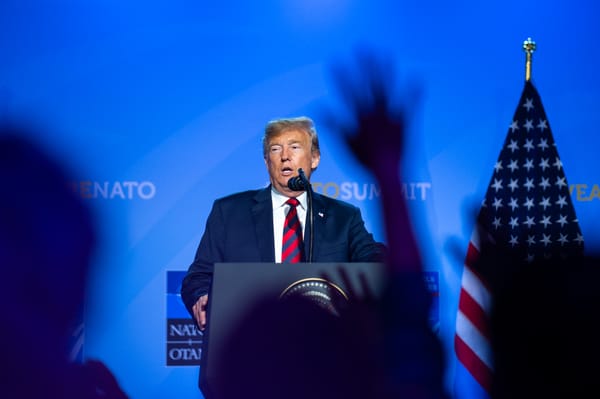This week, 20 European leaders gathered in Paris to reiterate their steadfast support for Ukraine’s struggle against the Russian invasion. This show of resolve was complicated by the complaints of Ukrainian leaders about their dwindling supplies of ammunition and their NATO allies’ inability to meet their commitments. It was just the latest indication of the dire state of the West’s war effort, and the unwillingness of European leaders to accept that they are losing. The weapons, training, and sanctions haven’t been enough to improve Kiev’s battlefield fortunes. On the propaganda front, too, the West has been losing ground as Gaza’s civilian death toll mounts.
A loss in Ukraine would almost certainly force change on NATO. Yet practically the only public figure openly calling for a restructuring of the Western Alliance is Donald Trump, who has long demanded that European countries pull their weight on the security front. Earlier this month, the former president and likely Republican presidential nominee raised eyebrows by suggesting he was fine with letting the Russians “do whatever the hell they want” with NATO allies who don’t do their part. But as undiplomatic as his way of making this point may have been, Trump was merely playing a role he has played in the past: voicing truths others won’t, for now.
The bad news from Ukraine makes clear that there are good reasons to fundamentally re-evaluate NATO’s mission and structure going forward. The difficulties with simultaneously supplying allies in Ukraine and Israel have shown that the United States no longer has a surplus of artillery shells or tanks or missiles to spare for another conflict, and won’t be able to rebuild its stocks anytime soon.
The problem is particularly acute given the looming threat of conflict with China over Taiwan. Europe doesn’t particularly want to join such a fight, nor could it do much to help, if it did. Militarily, Europe lacks the ability to project power to the other side of the world, and at the moment, the European economy is so weakened that imposing sanctions against the People’s Republic would trigger a crisis with major political fallout. In other words, the interests of the main players who make up NATO no longer align: Washington needs to “pivot to Asia”; the Europeans want the Americans to continue to back them against Russia, while avoiding escalation with the Middle Kingdom.
But this growing rift seems almost impossible to discuss openly. This is where Trump comes in. Despite the prohibition on acknowledging the divergence of US and European interests, the prospect of NATO’s dissolution is, in fact, being raised by pundits and journalists in the West—but only as a crazy idea that might be implemented if the Scary Orange Man is allowed back into the White House. Unpleasant truths about the alliance’s increasing unsustainability can only be acknowledged indirectly, in a psychological displacement whereby the very real structural problems NATO faces are transmuted into the quirks and obsessions of one man. The implication is that if only Trump loses, NATO will be fine and the status quo can be maintained.
“In the end, it may be Trump who forces them to face reality.”
We have seen this phenomenon before. During his 2016 campaign and his term in the White House, Trump’s views on China were ridiculed as idiosyncratic and extreme. Immediately after he left the White House, however, his China policies became the mainstream consensus; indeed, the Biden administration has gone further than Trump in some respects. It is no mystery why this happened. Because he was willing to offend the pieties that had prevailed for decades, Trump was able to recognize the objective logic of great-power competition that was driving a wedge between Beijing and Washington. In the end, that logic won out over petty partisanship.
The fact that the Western political establishment refuses to admit increasingly obvious truths speaks to a serious intellectual and ideological crisis. For those in charge in London, Berlin, and Stockholm, it is apparently easier to imagine the heat death of the universe than the disbanding—or even serious restructuring—of NATO, much as Washington politicians and pundits were unable to contemplate the fracturing of Chimerica not long ago. When the unimaginable starts to look inevitable, our ruling elites don’t have the words to talk about it; all they have is Trump, Trump, Trump. But in the end, it may be Trump who forces them to face reality.
